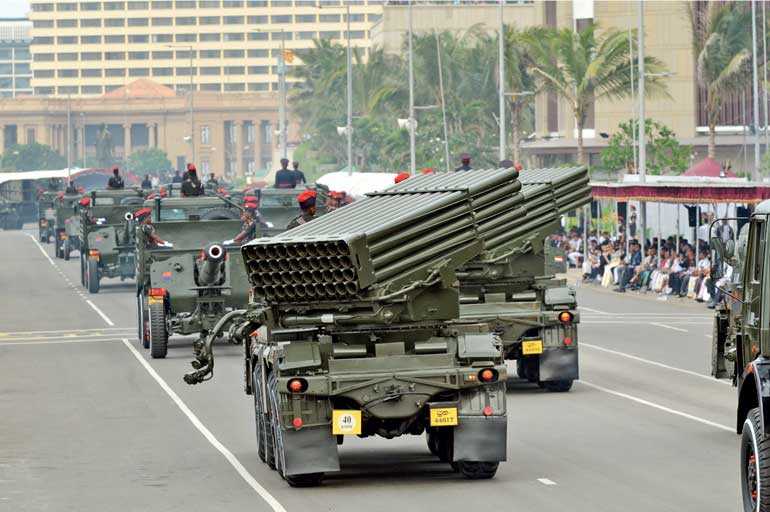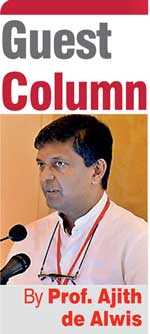Wednesday Feb 25, 2026
Wednesday Feb 25, 2026
Thursday, 21 February 2019 01:25 - - {{hitsCtrl.values.hits}}

Seventy-one years since 4 February 1948 is what our senses had been informed living in this beautiful isle since independence. Over the last 71 years we also have constantly described ourselves as a developing nation. As the day approaches having placed the National Flag both on moveable and immovable assets, we duly come together in demonstrating our allegiance and our undivided loyalty.
It is also interesting to note, if one is to take note of what Ivor Jennings who was in the thick of the process of independence wrote in his Autobiography that he really wanted 2 February to be the Day of Independence for Sri Lanka and not 4 February principally considering the 2nd as a more auspicious day – his evidence for understanding as such, the 2nd had been the date of his wedding! What cannot be verified now is his thinking whether he believed that in all years to come, 2 February to be an auspicious day!

He has in fact briefed the Prime Minister (the position was created in 1947) who has somehow forgotten the suggested date. Anyway as it turned out we now have to celebrate the 4th as the date due to a certain breakdown of communication and are we to assume that this date has come without the usual astrological thinking. Can someone who seriously believes in planets influencing our whole lives lament that this is the reason for all the subsequent problems of Sri Lanka!?
However, that many years later, the usual parade in Galle Face commemorates independence and when you watch and listen to the commentary with your thinking hat on, is not quite heartening. We appear to demonstrate our might through our purchases and may be gifts.
‘Made in Elsewhere’
We have positioned our defence through more or less through ‘Made in Elsewhere’. It is astonishing when we look around how dependent we are still in many ways to the outside and this dependency has its very direct cost as well as secondary costs, which accumulate negatively due to our lack of awareness.
There was much coverage subsequently over the Sri Lankan-made multi-barrel rocket launcher, which had been designed and developed by the Centre for Research and Development (CRD) of the Ministry of Defence. That news item written by many in many ways demonstrated perhaps the inner yearning that all may feel when you see and hear of a homemade product. On land, on sea and in air many were displayed and perhaps all except for this one item we have to acknowledge had been made elsewhere.
Cartoonists in a few instances did highlight the issue. Currently each bullet fired even for training implies foreign exchange moving out and we all know very well that securing dollars is a hard task. It was with great relief perhaps the Government announced on 14 January that a bond repayment that had to be paid had been paid which amounted to $ 1 billion. However, it is not over yet with repayments even for this year. As an economy with $ 87 billion this is lot of money, as we know this amounts to almost 9% of our export income per year. It is no secret that we spend most of our income these days in debt servicing.
The fact that we as an economy really lack resilience was also seen when the Customs stuck work and in deciding to work-to-rule. Containers failed to move out and thereby kind of stalled all activities in and around Pettah and the media headings to the effect of country facing a food crisis too were seen. Pettah with shutters down sent the image of a ghost street in the heart of the capital.
In all three past months of May we witnessed recurring extreme rainfall at times complementing droughts in some parts of the island. Now these are challenges coming our way basically not due to our faults. Yet when technologically backward with little or no abilities in manufacturing, Sri Lanka has very little climate resilience in case of extreme effects and the rising frequency of such events can wreak havoc, compounding our already precarious position.
The picture that went missing was the hustle and bustle of human weight lifters – natamis – and quite basic logistic operations. This, which is the typical picture when everybody is working, is not a picture of efficiency nor effectiveness. We have just sustained this type of situation with all associated inefficiencies for many a decade. Drop of a pen and lack of a signature can bring down this system to a grinding halt, definitely not an enviable situation.
Climate risks
While we have moved on regardless the country has now also been ranked second in the world for climate risks. Now this is a rating not be taken less seriously.
In all three past months of May we witnessed recurring extreme rainfall at times complementing droughts in some parts of the island. Now these are challenges coming our way basically not due to our faults. Yet when technologically backward with little or no abilities in manufacturing, Sri Lanka has very little climate resilience in case of extreme effects and the rising frequency of such events can wreak havoc, compounding our already precarious position.
If we are to continue like this there is the chance that we may – just may – celebrate 100 years of independence but with resilience at a very low ebb I really do not want to be celebrating 100 like this. Nor am I be happy to continue to listen to and teach others saying that we are a developing country.
We have to note that the picture of Colombo Harbour as well as ensuing impact of strikes taught quite a few lessons to Lee Kuan Yew who translated lessons into actions for Singapore. For him it took only 30 years to transform a small city nation to from a sleepy market place to a top notch destination. Over 71 years we appeared to have given others enough lessons to grow and shine.
Public service
The President in his Independence Day address came up with a statistic that should have everyone trying to achieve something different if we really care about being really independent. He commented on the 1.6 million public service and its 30% efficiency. A world record number of public servants operating at a very low efficiency but nursed and cared with scarce public funds cannot be a system that is only worthy of taking a verbal jab at.
The core in which I too am a member had to specifically make a note that this sad state of affairs cannot take us far. In fact it has really not taken us far as we know when seven decades later we cannot even get the hangman’s noose right – the ethical aspects of capital punishment is not the issue of discussion here but the technical aspect of even that has to come from outside.
Imagine what the improvements of efficiency and its impact would be if productivity were to hit 70%. Definitely 1.6 million should not just be efficient in moving files up and down but take on more the job of transforming the State to a more entrepreneurial position. That perhaps is the best way forward as pruning numbers may be an anathema – as we write there is more ramblings for dishing out State jobs to jobless graduates, but transforming the functional aspects to a completely different way where risks are taken, rewards are given and transfers between public and private are made, etc.
We do have a significant number of strong youth in the public sector whose main tasks for the day is preparing cups of tea for many a number of meetings. We have come to love our little meetings and definitely love the big ones as occasional absence in the middle of the meeting is not noticed by anybody.
Entrepreneurial state
The concept of the entrepreneurial state is not that old. It is a very practical concept championed by Prof. Mariana Mazzucato who really waxes eloquently on the power of the public sector. She has serious compelling arguments tearing apart the usual free market concepts, theories of private sector really contributing to growth, etc.
She really laments when governments failed to recognise their own role in innovation and today no one argues against innovation. Yes we too had the concept coming out in the Independence Day address even if not in great detail. Anyone who thinks that the State should not fund significantly should read her analysis how Google benefited from a simple National Science Foundation grant for research, Foundations of Biotechnology happened in public Medical Research Labs in UK, iPhones would have been quite dumb if not for many US Government research fundings and Vesta’s leadership in wind systems came from tax breaks in USA.
We in Sri Lanka are so weak in getting the Government to think and act in this manner. We may play with public money in many different ways but go lame when faced with a decision to embark on a journey which really has the potential to change our landscape. The preference to stay with the well-known and the comfortable is dragging us down but we do not understand this slow death.
Independence Day may be a day to reflect on how to shape the future, as one certainly cannot change the beginning. If we do this at least now the opportunity is there to change the future. The former Granary of the East should not be saying to the world that one out of every four children of ours is malnourished today!